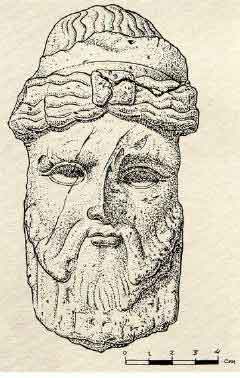.

The Tharsis Mask, possibly depicting Arganthonios
Arganthonios (Argantonio in Spanish) was the most important king of ancient Tartessos (in Andalusia, southern Spain).
The name Arganthonios derives from the Etruscan name "arcnti". To the Cempsi (neighboring Celts of southern Portugal) "argan" meant silver. So the name could mean "king of silver" or "man of silver". Tartessia and all of Iberia was rich in silver. There are other Celtic names that form the same term: -eilin (elbow of silver), Argeitlan (hand of silver). Arganthonios seems to have been more of a title than his real name.
Rule
According to Herodotus, King Arganthonios ruled Tartessia for 80 years, from 630 BC to 550 BC. Much of this Tartessian dynasty is told in legends, so no one knows what part is actually historical. He is said by the Greeks to have lived for 120 years while others state that he lived a longer 150 years. His empire consisted of all of Andalucía and extended to the Cabo de la Nao (a cape east of the Costa Blanca, south of the Gulf of Valencia). His empire was what may possibly have attracted Greek colonists to the Spanish coast. One of those colonies was Mainake, present-day Málaga. Though the capital of Tartessia sank in the mouth of the swampy Guadalquivir River (and now is famously thought to have been Atlantis), its sunken ruins show great fortifications and columns. Herodotus records his death after a naval battle won by the Greeks over a united fleet of Carthaginians and Etruscans. After losing over half their fleet, the Greeks stopped challenging military dominance in the area, and Tartessia, without an ally, became exposed to Carthaginian expansion
Arganthonios' Generosity
The Greek historian Strabo wrote of the wealth and great generosity of Arganthonios in the story of a Greek sailor named Koliaos whose ship was blown off course and landed in Tartessos. After being regally entertained for some months, his ship was loaded up with silver and he was sent home. The story also tells how Arganthonios gave the Greeks 1 1/2 tons of silver to build defensive walls to protect themselves from the Persians.
[edit]
Battle of Alalia (?)
A battle with no official name, before the death of Arganthonios, the Greeks and a fleet of Etruscan and Carthaginian ships fought off the coast of Alalia. The Greeks with 90 ships and the Etruscans and Carthaginians with 120. The Greeks won the battle but lost 40 ships and lost dominance in the western Mediterranean. Alalia is present day Aléria, Corsica.
After Rule
By 500 BC, Tartessia would have already suffered from Carthaginian attacks. The capital was surrounded and its walls demolished. When the capital fell the city and the empire sank into the Guadalquivir river. Mainake, the Greek colony which protected Tartessia from Carthage, also sank.
The Greeks compared Tartessia to Atlantis and Hesperides and possibly Tartessia was Atlantis. Hearing all these rumours about silver, good life, and luxury, the Greeks named the isolated west Isles of the Blessed, Tartessos.
Sources
- http://www.tartessos.info/html/argantonio3.htm
- http://www.oya-es.net/reportajes/tartesos.htm
- http://www.pantheon.org/articles/t/tartessos.html
| Ancient Greece
Science, Technology , Medicine , Warfare, , Biographies , Life , Cities/Places/Maps , Arts , Literature , Philosophy ,Olympics, Mythology , History , Images Medieval Greece / Byzantine Empire Science, Technology, Arts, , Warfare , Literature, Biographies, Icons, History Modern Greece Cities, Islands, Regions, Fauna/Flora ,Biographies , History , Warfare, Science/Technology, Literature, Music , Arts , Film/Actors , Sport , Fashion --- |
Retrieved from "http://en.wikipedia.org/"
All text is available under the terms of the GNU Free Documentation License

